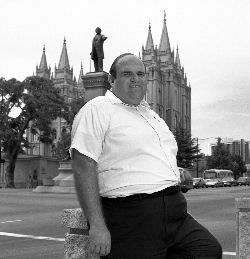About:
On Oct. 17, 1969, the 14 African- American players on the University of Wyoming's then-undefeated football team walked into coach Lloyd Eaton's office wearing black armbands. The team was preparing to play BYU at War Memorial the next day.
The players had a question. Could they wear black armbands in silent protest? The year before, in their victory at BYU, they said Cougars players taunted them with racial epithets. The Wyoming players had also learned that the Mormon Church, which BYU represents, did not allow African-Americans in the priesthood.
Eaton, citing a policy against protests, a rule no player had heard of, said no. He then kicked all 14 off the team for the rest of the season. Only three would play for Wyoming again.
Mike Robinson was a young white graduate student in the history program at UW who felt the 14 had a right to protest against BYU. He and other history students decided to stage their own protest. In this oral history, he tells the interviewer, historian Mark Junge, who also happened to be his roommate in college, not only what happened that October in 1969, but the amazing twist that followed some years later.
Dr. Robinson was a pioneering public works historian who tirelessly promoted historical research as a component of policy formation. He was associate editor (with Suellen Hoy) of the American Public Works Association's bicentennial History of Public Works in the United States, and wrote Water for the West: The Bureau of Reclamation, 1902-1977. Robinson served as research coordinator for the Public Works Historical Society, as the first historian of the Corps of Engineers Mississippi River Commission/Lower Mississippi Valley Division, and until his death in 1998 was the Division's Chief of Public Affairs.
Mike Robinson
Interview

